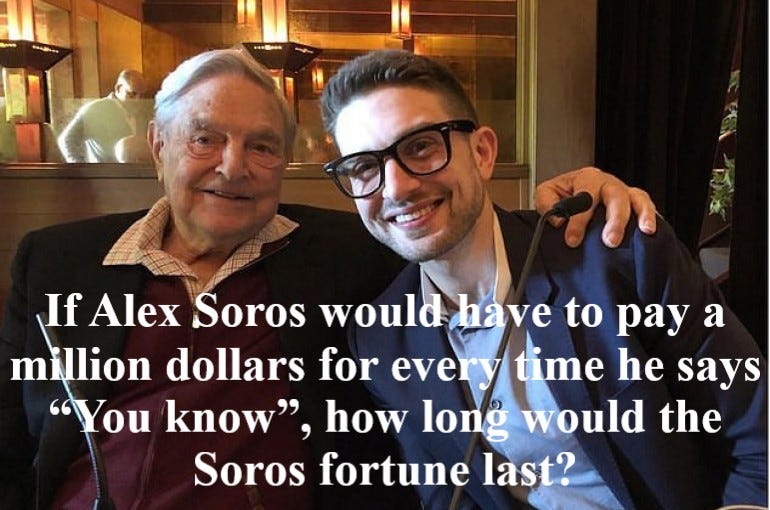This is just another week when everything and nothing is happening at the same time.
The more everything changes, the more everything remains the same.
On Ukraine
The Ukrainians are winning the war as they are retreating. All they need for a total victory is a little more money. If we give them a loan, let’s say $300 billion, they can guarantee that the money will be paid back from the reparation payments the humiliated Russians will be forced to pay after their unconditional surrender to the Ukrainian women and retirees of the latest mobilization who are on their way to become the most formidable military force on the planet.
According to official Ukrainian sources, the death toll of the war is over 500,000 soldiers in two years. The Americans lost 58,000 soldiers in the 20 years of the Vietnam war. That is why the Ukrainian victory will be that much more glorious.
But seriously, the money is running out, and even if The Biden administration can convince the house and the senate to approve the borrowing of a few billions, there is no place to spend it. Not on weapons and ammunition. Nobody has enough, or even the capacity to produce what Ukraine needs. Except the Russians, of course, but they can’t exactly go to them for it……..
On Davos and the WEF
Heard in Davos: What we learned from the WEF in 2024 (yahoo.com)
OpenAI CEO Sam Altman speaks at the World Economic Forum
What is most fascinating about the Davos meeting is its drab, boring stupidity. Small minded bureaucrats pontificating about the future of the world that they ar far to stupid to understand. Watch any of their panel discussions. They are embarrassing.
Alex Soros Heir To George Soros Can't Form Coherent Sentence At WEF
Watching the last one above made wonder:
… But that does not mean that the young Soros is not dangerous:
Soros, Facebook, And Omidyar Money Behind Attacks On German Farmers
On climate change and selling out
I watched this video:
I wasn't worried about climate change. Now I am.
Calling this fearmongering disgusting is an understatement.
The desperate tone of it made me wonder who is behind it?
So I did a simple search: "Sabine Hossenfelder World Economic Forum"
This was the top link:
https://www.weforum.org/agenda/authors/sabine-hossenfelder/
She is an 'agenda contributor'. She is a globalist sell-out. She became a WEF whore.
It's a pity. I used to like her.
My comment disappeared after a few hours. I posted it again, it disappeared again.
It could be just her, but does it matter?
On the commoditization of my self
The essence of communist existence is the understanding that my social reality is not about me, but the system. The understanding that I don’t matter, that my time doesn’t matter.
Anything I get in a socialized system is under the full control of the power that ‘socialized’ it. As a recipient of the service, I am not treated as the person who paid for it but as someone who benefits from it. The people I am interacting with are agents and representatives of the benevolent state.
You are just a supplicant and will be treated accordingly.
This is a big subject, I will have to return to it in a full post.
On European immigration
The @goodcitizen have this to say in his post Chariots of Wire:
There hasn’t been any Great Replacement in France either, where millions of immigrants from all her former Magrehbi and Sub-Saharan colonies have invaded the homeland.
France’s national motto is Liberté, fraternité, and Suicideté. Just kidding, it’s Liberté, égalité, fraternité. The liberty and brotherhood are fine, but the égalité is where things get perilous for poor France because in the spirit of equality, she doesn’t bother keeping any demographic statistics.
That would be racist.
When you don’t bother keeping statistics, you can just make shit up.
The French government says its foreign-born Muslim population is anywhere from 5-9% of the population but as someone who lived in France for three years, it’s more like 20-30% and up to 60% in places like Marseilles.
I had to comment:
I was living in Paris 1979-80. One night I was on the subway with my girlfriend around 11pm at Place Stalingrad. I looked around. At that our, it was not crowded, but still full. All seats were taken. My girlfriend and I were the only two white people on the Subway car.
AND WE WERE NOT FRENCH!
I doubt that it got better in the past 43 years
On my last post
I don’t know what were my expectations with my last post.
To start a conversation?
The acknowledgement that it makes no sense to take sides in a puppet show?
That someone may offer an alternative vision?
That I am not alone hoping that permanent peace is possible?
Peace never comes without a price, but it should be possible.
Why is there no serious talk about the possibility of settling the conflict once and for all?
Let me know in the comments.
Did you forward my letter to Donald Trump to anybody?
Thank you for reading this.
Like everything else on Substack, this is a reader supported publication.
You can help it by following or subscribing.
You can engage with it by clicking on like and/or commenting.
You can help it grow by sharing, recommending, quoting or referencing it.
You can support it by pledging your financial support.
Any and all of it will be much appreciated.







I WANTED TO ASK YOU ABOUT YOUR NAME: so I thought that I would dump 1,000 words here and see what you say?
The Huns, as well as the Asiatic Huns, were not a young people. Their history is consistently traced from the great reforms of their leader Mode, who seized power by patricide in 209 BC.: the Asian Hunnish power lasted from the moment of its foundation - 209 B.C. - to the time of the deposition - 48 B.C.
the Türks and Huns, were dominated by a horde, i.e. a group of people united by discipline and leadership. It required neither origin, nor language, nor creed, but only courage and willingness to obey. Clearly, the names of hordes are not ethnonyms, but with hordes, ethnonyms disappear altogether, as there is no need for them - the concept of a "people" coincides with the concept of the nation state.
The steppe was dominated by the clan system, and its decay proceeded so slowly that it did not cause much damage to the nomads. On the other hand, the desiccation of the steppe, which began in the 1st century and reached its maximum by the 3rd century, oppressed them. The reduction of pasture lands forced the Huns and Xianbi to shrink to the Huang He and Liaohe rivers and come into contact with the Chinese.
Since those lands were in disrepair, the Jin government permitted the settlement of 400 thousand nomads and about 500 thousand Tibetans of various tribes on the border. The Chinese politicians of the 3rd century thought that ethnicity was a social status and a numerically insignificant inclusion was easy to assimilate: those migrating princes were trained in Chinese culture, and the tribesmen were turned into a taxed class. The calculation was audacious and bad. The clansmen endured the arbitrariness of officials and exploitation of landowners, but they did not turn into Chinese; the princes learned hieroglyphics and classical poetry, but at the opportunity, which came in 304, returned to their tribesmen and led a rebellion, aimed at "regaining lost rights with weapons.
____________________
The Xiongnu is a nomadic power that emerged in modern Mongolia earlier than the 4th century B.C. The Turkic-speaking Xiongnu, being a pre-class society, created a power based on "dominion over the peoples”. From 209 B.C. to 97 B.C. the Xiongnu power grew and defeated the best forces of mighty China, and after that the victorious Xiongnu steadily weakened, and the defeated China became the master of the situation without a fight, i.e. their former victory was not of use to the Xiongnu.
In the I century AD Huns were freed from the power of China, but split into four branches, one of which, most indomitable and freedom-loving, repulsing enemies attacking from all sides, in the 155-158 years disappeared in the west of the Great Steppe, mingled with the Ugric of the Volga-Ural interfluves and became for 200 years in the Eastern European ethnic group, which for the avoidance of confusion is called "Hunnu".
It is a very common opinion that the Great Migration of Peoples in Europe was due to the advance of the nomadic Huns from the Trans-Volga region. However, familiarity with the dates of the events allows this view to be rejected completely.
In the III-IV centuries Huns defeated Alans, "exhausting them by an endless war", and only in the V century crossed the Carpathians and reached the Danube valley, and a part of their Akatsirs remained in their native steppes on Don and Volga.
Hence, the Hun activity took place three centuries later than the explosion of the Great Migration; there was not a mass migration from Asia either, but a skillful policy of the experienced leaders, skilled in diplomacy and strategy. The Goths, in comparison with the Huns, were as frivolous and naïve as children. That is why they lost the war and lost their beautiful country near the Black Sea. In the II-IV centuries, the Black Sea steppes were the second source, (after Egypt) of bread for Constantinople. So farming was mastered in the Alanian steppes and river valleys.
The Huns crossed the Don, defeating the Alans in 371, defeated the Goths with the help of the Wolverines in the end of the IV century, and took Pannonia about 420. Hence, the whole stay of the Hunnish horde in the southern steppes fits in less than half a century. In that case the Huns themselves were not numerous, and they behaved with the help of the same subdued Alans, Wolverines, Antes, Ostgotians, and other local tribes. If all inhabitants of the Eastern Europe were massacred by the Huns, from where would Huns get people for the war with the Roman Empire and Iran?
It is true that the settled-agricultural economy was destroyed by the Hun invasion, but it does not follow that the inhabitants of the forested valleys of the Terek and Middle Don or the reed thickets of the Volga Delta did not outlive the short-term movement of the nomads in their shelters, especially since they were not engaged in agriculture, because they were hunters and fishermen. Even Alans lived in the steppes of the North Caucasus and the Don until the 10th century, which characterizes the stability of Eastern Europe at the time when intensive ethnic processes took place in Central Europe.
It is also important to note that the success of Huns coincided with the climax of temporal drying up of steppe, which undermined the Alanian agriculture, and thus weakened the Alanian military force. Huns, on the other hand, accustomed to the arid conditions, suffered less from the drought, which caused their victory in the wars, waged by them from 160 till 370 but without any decisive successes. But as soon as the dry period was over, the domination of the Huns was also over. In the VI century in the steppes, the old balance of forces was restored, but the place of Huns was taken by Bulgars, and the place of Alans - by Khazars.
.
"time is God's way of keeping everything from happening all at once" -- Ray Cummings (and not Einstein or Hawkings) https://quoteinvestigator.com/2019/07/06/time/?amp=1